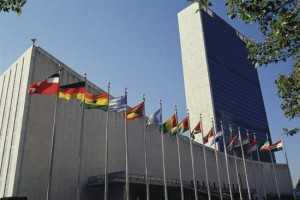UN Leaders Lament 20-Year Failure to Advance Abortion
 The self-styled “master planner” of a 1990s landmark population conference last week lamented the failure to subsequently advance reproductive rights, often a code for abortion.
The self-styled “master planner” of a 1990s landmark population conference last week lamented the failure to subsequently advance reproductive rights, often a code for abortion.
Tossing aside her prepared speech, former UN Population Fund chief Nafis Sadik revealed she used donations to enable activists to be on government delegations to the 1994 Cairo conference.
Cairo itself represented a bit of progress, she said. “But since then we’ve just been fighting this battle all over again and again.”
Sadik spoke off-the-cuff at an International Planned Parenthood Federation event at the UN. The abortion group hosted a panel to announce its “Vision 2020 Manifesto,” which envisions governments providing sexual and reproductive rights and comprehensive sex education.
Sadik chastised Planned Parenthood for being timid in its new plan and “retreating from our own goals.” She criticized the goals as less than the UN had set nearly 20 years ago.
Sadik was secretary general of the 1994 Cairo International Conference on Population and Development. At the conference, she launched an effort to replace the term “population control” with “reproductive rights.” The strategy marked a turning point in the abortion debate, becoming the signature event that propelled the pro-life movement into the UN.
In 2000, Sadik reportedly wept at the end of a five-year review of another conference held in Beijing in 1995.That review document did not expand reproductive and abortion rights. She was particularly bitter a provision was defeated that would have increased access to abortion and required health providers to be trained to do abortions even if it violated their consciences..
“I had hoped to . . . [point] out all the progress that has been made by women and on behalf of women since we met five years ago in Beijing,” she said in her speech at that time to the General Assembly.
“In 2014, we should be talking about progress from 1994,” said Babatunde Osotimehin, the current director of the UN population fund said at the Planned Parenthood event. “We should not be talking about maintaining the work we had before, we should talk about progress.”
On sexual and reproductive health and rights, “we get push back from just about every part of the world: Africa, Asia, Central America, Latin America and Europe,” he said.
The UN population fund is reviewing data from the 179 countries that signed the Cairo agreement with an eye on compliance. While many at that time thought the world was overpopulated, experts now say the looming threat is from too few people.
Babatunde gave a nod to this problem, then reverted to his agency’s focus of reducing births. Many countries complain about dwindling population and growth, about women not having children, he noted. “But on the other hand, we don’t want to give them what they require to control their bodies and their fertilities.”
The UN fund is the largest multilateral source of funding for population and reproductive programs. Its estimated budget for 2012-2013 was $1.7 billion.
Donors spent $11.6 billion on population activities in 2011. Developing countries spent $54.7 billion. Still, a recent UN Secretary General report claimed these are below what is necessary to fully implement UN goals.

